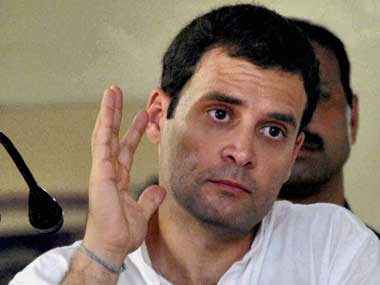Professor Rahul Gandhi’s lecture in astrophysics to Dalits in Uttar Pradesh last week was underwhelming (like most of his public speeches) and made the Congress Vice-President a subject of much mockery.
But beyond the soaring metaphors, the meaning of which may have escaped his audience with velocity, at least some people are appreciating Gandhi for raising the issue of Dalit emancipation. Writing in The Economic Times on 14 October, the noted Dalit writer and intellectual Chandra Bhan Prasad says, “It is truly humbling that there is at least one leader from the mainstream, Rahul Gandhi, who has been consistently talking about Dalit emancipation…With the rise of BSP, the political system had given up on Dalit uplift. Now, Rahul with his political-physics metaphor has put Dalits on the political centre stage again.”
However Prasad’s article is hardly a ringing endorsement of either Rahul or the Congress. It is in fact the opposite.
[caption id=“attachment_1172017” align=“alignleft” width=“380”]  PTI[/caption]
Chandra Bhan Prasad quotes a study conducted in 2008 by the Centre for the Advanced Study of India (CASI) at the University of Pennsylvania.
The study surveyed Dalit households in two rural blocks of the UP districts of Azamgarh and Bulandshahr to analyse the changes in Dalit lifestyles after economic liberalisation. The study, led by the noted political scientist Devesh Kapoor, identified two major drivers of Dalit upward mobility in the period between 1991 and 2008.
The families which had progressed most were those in which a member of the family had a Government job or those in which a member of the family had migrated to industrial towns.
In both cases, the families who had a member working in an industrial town were better off on almost all indicators of development than the families still rooted to the village. Significantly, only 7 percent of Dalit families had a relative in the government whereas over 33 percent had a family member in an industrial town.
Chandra Bhan Prasad’s conclusion is simple: Rahul Gandhi may have picked the right platform but he is on the wrong track. His pet programmes whether the NREGA or the Right to Food end up incentivising their recipients to stay their native villages. For Dalits, this often means entrapment in the old feudal and caste structures of rural India,
The Congress Party’s policies are not disastrous just for Dalits. They are bad for any deprived individual or community which is looking for quick upward mobility. NREGA and Right to Food are mere crumbs which may (or may not) make the lives of the poor a little less insufferable. They are not a path to upward mobility. Government jobs are too few to make a real difference.
For prosperity, the poor (whether Dalit, Muslim, OBC or Upper Caste - poverty is secular) need two things: quality education and gainful employment. Rahul Gandhi’s party has spent nine years in Government without much to show for either. It’s no surprise that Rahul only talks of NREGA and Food Security - there is no other achievement to talk about.
Rahul Gandhi and his party are wedded to the “entitlements-based”, “state-led” approach to development. That is condemning the poor to non-functional Government schools and a statist economy which isn’t generating enough proper jobs. It is a pity that the youthful Mr. Gandhi has little faith in the power of the free market to provide access and opportunity (without discriminating on religion, caste and gender) to the deprived.
Or maybe as child of liberalization himself he does have faith; it’s just that as a child of a political dynasty he sees no votes in the invisible hand of the market replacing the visible hand of the Congress in delivering a better life to India’s poorest. For Rahul Gandhi, poverty is indeed a state of (his) mind.


)
)
)
)
)
)
)
)
)



